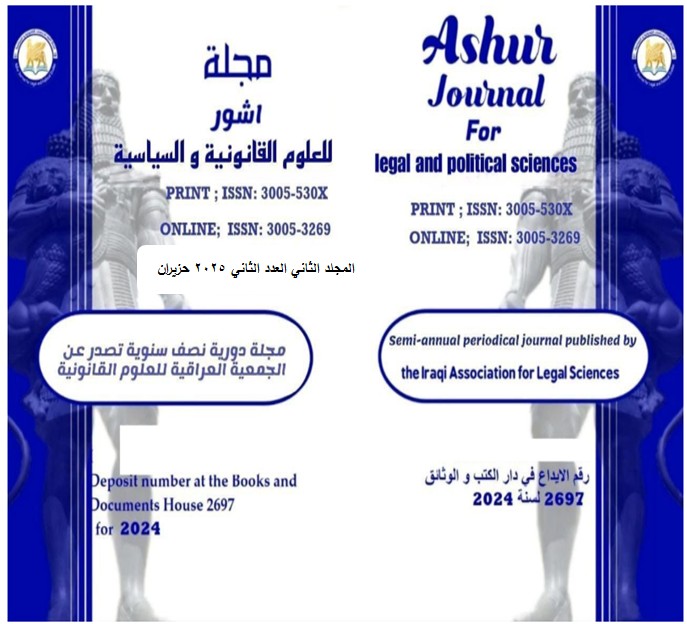The Principle of State Continuity Under Cyber Governments and Digital Exile: An Analytical Study in Light of Public International Law
DOI:
https://doi.org/10.64184/ajlps.V2.I2.Y2025.P578-600.61Keywords:
State continuity, cyber government, digital exile, sovereignty, international legal personality, public international law.Abstract
This study explores the principle of State continuity within the framework of public international law, focusing on its applicability in light of recent transformations in the structure of governments—particularly the emergence of cyber governments and digital governments-in-exile. The research analyzes the legitimacy of maintaining international legal personality in the absence of effective territorial control, drawing upon international jurisprudence, doctrinal writings, and contemporary practices. The study concludes that the principle of State continuity—although unwritten—is a well-established norm that provides legal flexibility, enabling States to maintain their international status under exceptional circumstances. This is contingent on factors such as the existence of a legitimate government, the preservation of international obligations, and continued external representation. The paper recommends the development of a specialized legal framework to govern digital or exiled governments in the cyber age, thereby reinforcing their legitimacy and securing international protection.
References
First: Books in Arabic
1. Dr. Muhammad Sami Abdel Hamid, Public International Relations Law, Cairo, Dar Al Nahda Al Arabiya, 2002.
2. Dr. Muhammad Al Majzoub, Public International Law, Beirut, Al Halabi Legal Publications, 2009.
3. Malcolm Shaw, Public International Law, translated by Dr. Talat Abdel Salam, ninth edition, Cambridge University Press, 2021.
Second: International Agreements and Documents
1. Montevideo Convention on the Rights and Duties of States of 1933.
2. Vienna Convention on the Law of Treaties, 1969.
3. International Court of Justice, Advisory Opinion on the Legality of the Threat or Use of Nuclear Weapons, I.C.J. Reports 1996.
4. International Court of Justice, Advisory Opinion on the Declaration of Independence of Kosovo, July 22, 2010.
5. United Nations Security Council Resolution 662 (1990), UN Doc. S/RES/662 (1990), of 9 August 1990.
6. United Nations General Assembly Resolution 45/240 of 21 December 1990 on the situation between Iraq and Kuwait.
7. United Nations General Assembly Resolution 2758 (XXVI), on the restoration of the rights of the People's Republic of China in the United Nations, adopted on 25 October 1971.
8. Report of the Secretary-General on the situation in Afghanistan, document S/2022/64, dated 28 January 2022.
Third: Foreign References
1. Shaw, Malcolm N., International Law, 8th ed., Cambridge University Press, 2017.
2. Shaw, Malcolm N., International Law, 9th ed., Cambridge University Press, 2021.
3. Crawford, James, Brownlie’s Principles of Public International Law, 9th ed., Oxford University Press, 2019.
4. Crawford, James, The Creation of States in International Law, 2nd ed., Oxford University Press, 2006.
5. Talmon, Stefan, Recognition of Governments in International Law, Oxford University Press, 1998.
6. Grant, Thomas D., The Recognition of States: Law and Practice in Debate and Evolution, Praeger, 1999.
7. Dugard, John, Recognition and the United Nations, Cambridge University Press, 1987.
8. Cassese, Antonio, International Law, 2nd ed., Oxford University Press, 2005.
9. Brownlie, Ian, Principles of Public International Law, 7th ed., Oxford University Press, 2008.
10. Gray, Christine, International Law and the Use of Force, 4th ed., Oxford University Press, 2018
11. Marek, Christina, Identity and Continuity of States in Public International Law, Geneva: Librairie Droz, 1954.
12. Schmitt, Michael N. (Ed.), Tallinn Manual 2.0 on the International Law Applicable to Cyber Operations, Cambridge University Press, 2017.
13. Schaap, Arjen, “Cyber Governments in Exile: International Law and Digital State Continuity,” Journal of Cybersecurity and International Law, Vol. 3, 2021.
14. Fenwick, Mark; Vermeulen, Erik P. M.; & Kaal, Wulf A., Regulating Digital Government: Governance, Innovation, and Cyber Sovereignty, TILEC Discussion Paper No. 2020-018,
15. D’Aspremont, Jean, International Law: Foundations and Principles, Edward Elgar Publishing, 2022.
16. Daugirdas, Kristina, “Cyber Governments and the Continuity of Statehood: Rethinking Sovereignty in the Digital Age,” Michigan Journal of International Law, Vol. 43, No. 2, 2022.
17. Melzer, Nils, Cyber Operations and the Use of Force in International Law, Oxford University Press, 2012.
Downloads
Published
Issue
Section
License
The authors retain Full copyright of their published article
Ashur Journal of Legal and Political Sciences applies the Creative Commons Attribution 4.0 International (CC BY 4.0) License to articles and other works we publish. If you submit your paper for publication by AJLPS, you agree to have the CC BY 4.0 license applied to your work.
Articles can be read and shared for under the following conditions:
BY: Attribution must be given to the original source (Attribution)
Full details available at
https://creativecommons.org/licenses/by/4.0/






